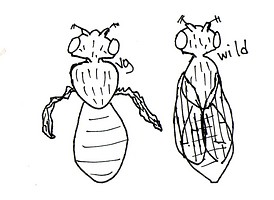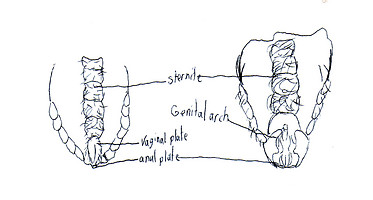Introduction
Our project is mainly learning about genetics. Genetics is studying about taking certain traits from one generation to another. These traits are hereditary. Our project was using fruit flies and mixing certain type of breeds to see how it would affect the next generation by seeing what the sex and types of flies are produced. We used fruit flies because they don't live long and we would be able to see a few generations over a small period time. They are small scale animals so it was easy to contain them. Our group examined wings, using vestigial and wild.
Phenotypes
VG (vestigial): crumpled wings
Wild (+): regular wings
Life Cycle Log
| date
| Observations Vial 1 | Observations Vial 2 |
| 3/16 | females are getting pregnant and one is dead | nothing yet |
| 3/17 | most females are pregnant | nothing yet |
| 3/20 | larvae seen in vial 1 | 5 flies died in vial 2 died median pretty crusty on top |
| 3/21 | larvae only seen in vial 1 | same as before |
| 3/23 | pupae/larvae in vial 1 | space amount of pupae /larvae in vial 2 |
| 3/24 | lot more pupae, larvae still there climbing up the walls | same as vial 1 |
| 3/27 | still a lot of larvae and many of them have hatched some with wild and some with vg | same as vial 1 |
| 4/17 | vial 1 looks ok. Lots of flies and pupae | vial 2 lookin purty nasty. Not much flies or pupae |
Sexing the flies
First we would empty the flies into an empty vial. Than we would quickly put the foam cork on the top and stick a wand full of fly nap into the vial. Once the flies are all unconscious, we empty them onto an index card and sort them. We record the numbers and then proceed to empty the flies into the morgue.
F1 Predictions
We predicted that the F1 offspring would consist of only wild, since wild is dominant.
Punnett Square:
+_____________+
VG] +vg +vg
VG] +vg +vg
F1 Outcomes
We came to find that there were both VG and wild. We suspected there was some kind of contamination.
F2 predictions
We predicted that the F2 generation would equally be both VG and wild.
Punnett Square:
w___________vg
vg] wvg vgvg
w] ww wvg
And we were right.
F2 Final Count
VIAL 1
| Date | Female Wild | Male Wild | Female VG | Male VG |
| 4/17 | 61 | 17 | 13 | 6 |
| 4/19 | 12 | 11 | 5 | 1 |
| 4/21 | 3 | 5 | 0 | 6 |
| 4/24 | 10 | 24 | 9 | 6 |
| 4/25 | 9 | 4 | 0 | 0 |
| Overall Total: 202 | Female wild total: 95 | Male wild total: 61 | Female VG total: 27 | Male VG total: 19 |
VIAL 2
| Date | Female Wild | Male Wild | Female VG | Male VG |
| 4/17 | 4 | 2 | 0 | 0 |
| 4/19 | 2 | 1 | 3 | 3 |
| 4/21 | 0 | 0 | 0 | 0 |
| 4/24 | 13 | 6 | 1 | 7 |
| 4/25 | 3 | 1 | 2 | 2 |
| Overall Total: 50 | Female wild total: 22 | Male wild total: 10 | Female VG total: 6 | Male VG total: 12 |
Conclusion
In conclusion, our hypothesis was that wild would be dominant. For the most part, it was true with only vial 1, not with vial 2. A couple problems came up during the experiment, like in vial 2, most of the flies died. In vial 2 the medium was dry and crusty. Getting the flies out of the vials was difficult. Having to turn the vials upside down was hard to do by yourself, but with two people it wasn't that hard. If we ever attempted this experiment again, I would make sure of the following things: the flies would be easier to distribute, maybe using a different procedure for transferring the flies. The experiment didn't really leave us with any unanswered questions, but we did wonder one thing: how did we get contamination into vial 1?
Neurology
I think something needs to be said for those brave flies who gave their lives for my experiment Well, I'm sorry for raising you, killing you and then tossing you into a jar of rubbing alcohol. Rest in peace, brave warrior.






 Go to quick links
Go to quick search
Go to navigation for this section of the ToL site
Go to detailed links for the ToL site
Go to quick links
Go to quick search
Go to navigation for this section of the ToL site
Go to detailed links for the ToL site